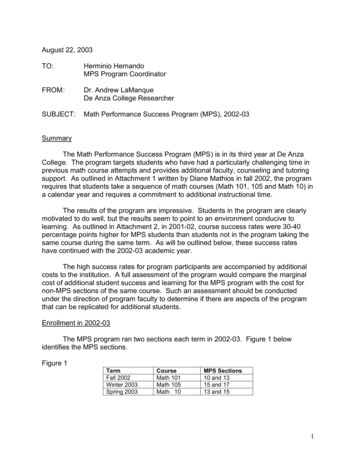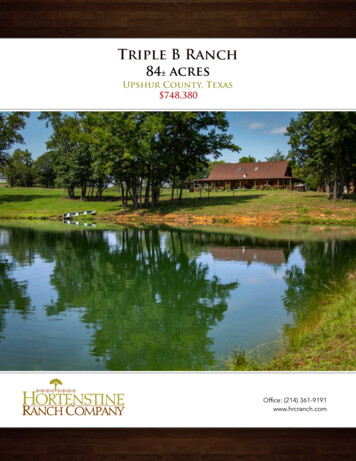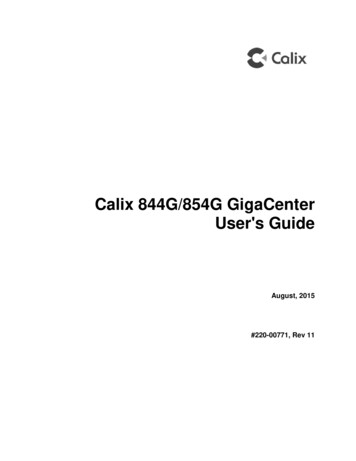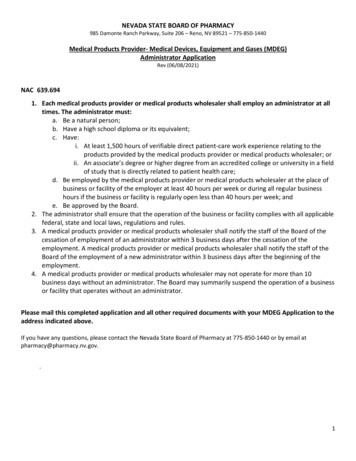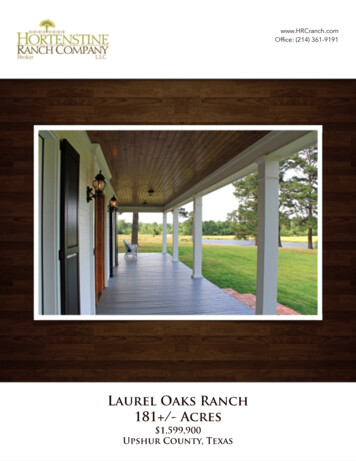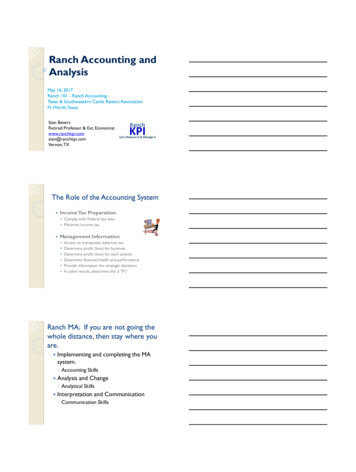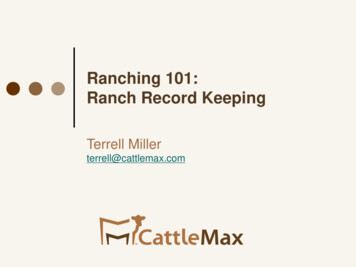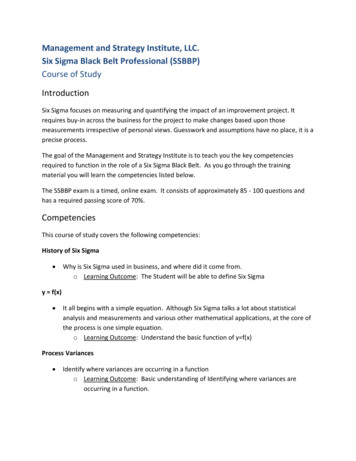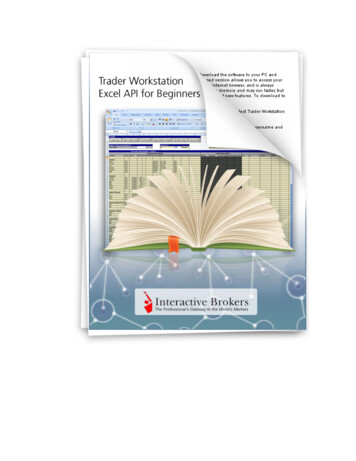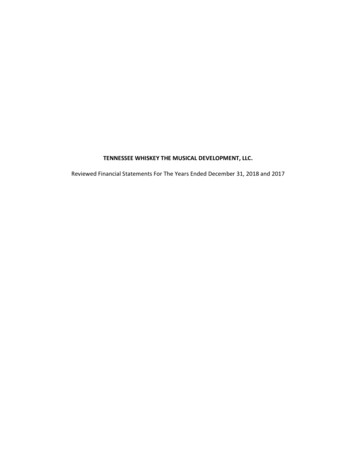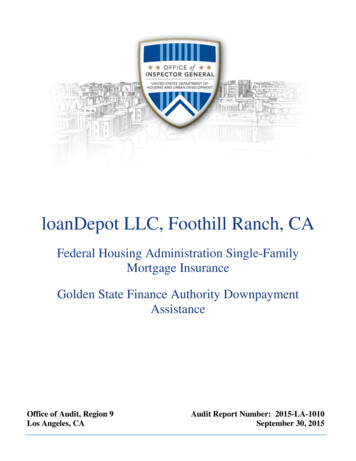
Transcription
loanDepot LLC, Foothill Ranch, CAFederal Housing Administration Single-FamilyMortgage InsuranceGolden State Finance Authority DownpaymentAssistanceOffice of Audit, Region 9Los Angeles, CAAudit Report Number: 2015-LA-1010September 30, 2015
To:Kathleen A. ZadarekyDeputy Assistant Secretary for Single Family Housing, HUDane M. NarodeAssociate General Counsel for Program Enforcement, CACC//SIGNED//From:Tanya E. Schulze, Regional Inspector General for Audit, 9DGASubject:loanDepot’s FHA-Insured Loans With Golden State Finance AuthorityDownpayment Assistance Gifts Did Not Always Meet HUD Requirements.Attached is the U.S. Department of Housing and Urban Development (HUD), Office of InspectorGeneral’s (OIG) final results of our audit of loanDepot, LLC’s use of downpayment assistanceprograms in conjunction with Federal Housing Administration (FHA)-insured loans.HUD Handbook 2000.06, REV-4, sets specific timeframes for management decisions onrecommended corrective actions. For each recommendation without a management decision,please respond and provide status reports in accordance with the HUD Handbook. Please furnishus copies of any correspondence or directives issued because of the audit.The Inspector General Act, Title 5 United States Code, section 8M, requires that OIG post itspublicly available reports on the OIG Web site. Accordingly, this report will be posted athttp://www.hudoig.gov.If you have any questions or comments about this report, please do not hesitate to call me at213-534-2471.
Audit Report Number: 2015-LA-1010Date: September 30, 2015loanDepot’s FHA-Insured Loans With Golden State Finance AuthorityDownpayment Assistance Gifts Did Not Always Meet HUD RequirementsHighlightsWhat We Audited and WhyWe audited loanDepot, LLC, based on a referral from the U.S. Department of Housing andUrban Development’s (HUD) Quality Assurance Division detailing a separate lender thatoriginated Federal Housing Administration (FHA)-insured loans containing ineligibledownpayment assistance gifts. The focus on loans with Golden State Finance Authority (GoldenState) gifts was a result of a separate audit (2015-LA-1009) on loanDepot’s use of downpaymentassistance. Our objective was to determine whether loanDepot originated FHA loans containingGolden State downpayment assistance grants in accordance with HUD FHA requirements.What We FoundloanDepot’s FHA-insured loans with Golden State downpayment assistance gifts did not alwayscomply with HUD requirements, putting the FHA insurance fund at unnecessary risk, includingpotential losses of 5.5 million for 62 loans with ineligible gifts and 16.1 million for 178 loansthat likely contained ineligible gifts. Looking forward 1 year, this is equivalent to at least 16million in potential losses for loans that would contain ineligible gifts and have a higher risk ofloss in the first year. Also, loanDepot inappropriately charged borrowers 13,726 in fees thatwere not customary or reasonable. This condition occurred because loanDepot relied on GoldenState, accepted the Platinum Downpayment Assistance Program structure, and did not conductits own due diligence with regard to premium pricing, gifts, and fees. The ineligible loans putborrowers at a disadvantage due to higher monthly mortgage payments, including the burden offunding the downpayment assistance program through premium interest rates.What We RecommendWe recommend that HUD determine legal sufficiency to pursue civil and administrativeremedies against loanDepot for incorrectly certifying that mortgages were eligible for FHAmortgage insurance. We also recommend that HUD require loanDepot to (1) stop originatingFHA loans with the ineligible gifts; (2) indemnify HUD for the 62 loans with ineligible gifts; (3)indemnify HUD for loans that likely contain ineligible gifts from the remaining 233 loans; (4)reimburse borrowers for 13,726 in fees that were not customary or reasonable; (5) reduce theinterest rate for borrowers who received ineligible gifts; (6) reimburse borrowers for overpaidinterest as a result of the premium interest rate; and (7) update all internal controls to includespecific HUD requirements on gifts, premium rates, and allowable fees.
Table of ContentsBackground and Objective.3Results of Audit .4Finding: loanDepot’s FHA-Insured Loans With Golden State Finance AuthorityDownpayment Assistance Gifts Did Not Always Meet HUD Requirements . 4Scope and Methodology .11Internal Controls .13Appendixes .14A. Schedule of Questioned Costs and Funds To Be Put to Better Use . 14B. Auditee Comments and OIG’s Evaluation . 15C. Criteria . 76D. Summary of Loans With Ineligible Downpayment Assistance .78E. Summary of Loans With Fees That Were Not Customary or Reasonable . 812
Background and ObjectiveThe Federal Housing Administration (FHA) was created by Congress in 1934 and providesmortgage insurance on loans made by FHA-approved lenders throughout the United States andits territories. FHA is the largest insurer of mortgages in the world, having insured more than 34million properties since its inception. FHA’s Mutual Mortgage Insurance Fund provides lenderswith protection against losses as a result of homeowners defaulting on their mortgage loans.Lenders bear less risk because FHA will pay a claim to the lender in the event of a homeowner’sdefault. Loans must meet certain requirements established by FHA to qualify for insurance.FHA generally operates from self-generated income and only recently began receiving part of itsfunding from taxpayers.Under most FHA programs, the borrower is required to make a minimum downpayment of atleast 3.5 percent of the lesser of the appraised value of the property or the sales price.Additionally, the borrower must have sufficient funds to cover borrower-paid closing costs andfees at the time of settlement. State housing finance agencies are significant sources of homeownership assistance programs, such as assistance with closing costs or rehabilitation. Amajority of these programs include providing funding to borrowers for the FHA minimum cashinvestment. Although the U.S. Department of Housing and Urban Development (HUD) does notapprove downpayment assistance programs, the lenders using the programs must ensure thatfunds provided comply with HUD FHA requirements.On July 9, 2009, loanDepot, LLC, a nonsupervised lender, was approved to originate FHAinsured loans. It received direct endorsement authority on May 3, 2010. Under FHA’s DirectEndorsement program, approved lenders may underwrite and close mortgage loans withoutFHA’s prior review or approval. The lender serves consumers across the Nation under thenames loanDepot, imortgage, Mortgage Master, and LDWholesale. It is licensed in all 50 Statesand operates four online direct-lending business centers, with dual headquarters located at 26642Town Centre Drive, Foothills Ranch, CA, and 5465 Legacy Drive, Suite 400, Plano, TX. Thelender also operates 130-plus retail branch locations under imortgage and Mortgage Master.Between October 1, 2013, and January 31, 2015, loanDepot identified 308 FHA-insuredmortgage loans that included downpayment assistance from the Golden State Finance Authority(Golden State). Since 2010, Golden State 1 has administered the Platinum DownpaymentAssistance Program to help low- to moderate-income home buyers purchase a home throughparticipating lenders. The downpayment assistance is provided as a non-repayable grant to beused toward a borrower’s downpayment, closing costs, or both.Our objective was to determine whether loanDepot originated FHA loans containing GoldenState downpayment assistance grants in accordance with HUD FHA requirements.1Golden State is a California housing finance agency and a duly constituted public entity and agency. It changedits name on January 27, 2015, and was previously known as the California Rural Home Mortgage FinanceAuthority Homebuyers Fund.3
Results of AuditFinding: loanDepot’s FHA-Insured Loans With Golden StateFinance Authority Downpayment Assistance Gifts Did Not AlwaysMeet HUD RequirementsLoanDepot’s FHA-insured loans that included Golden State Finance Authority (Golden State)downpayment assistance gift funds did not always comply with HUD FHA requirements. Inaddition, loanDepot improperly charged fees that were not customary or reasonable. A review of75 loans endorsed from October 1, 2013, to January 31, 2015, determined that 62 loans includedineligible downpayment assistance gifts. This condition occurred because loanDepot relied onGolden State, accepted the Platinum program structure, and did not conduct its due diligencewith regard to premium pricing, minimum cash investment, and gifts. As a result, loanDepot putthe FHA insurance fund at unnecessary risk, including potential losses of 5.5 million for the 62loans with ineligible gifts and 16.1 million for the 178 loans that likely contained ineligiblegifts. Looking forward 1 year, this is equivalent to at least 16 million in potential losses forloans that have a higher risk of loss in the first year. FHA borrowers were also charged 13,726in fees that were not customary or reasonable. Additionally, the ineligible loans put borrowers ata disadvantage due to higher monthly mortgage payments imposed, including the burden offunding the downpayment assistance program through the premium interest rate.loanDepot Allowed Ineligible Downpayment AssistanceloanDepot inappropriately originated FHA loans with ineligible downpayment assistance giftsprovided through the Golden State Platinum program. It allowed premium pricing to be used asa source of funds for borrowers’ downpayments and allowed gifts that were not gifts as definedby HUD. Using data obtained fromloanDepot, we identified 308 FHA-insuredloanDepot allowed ineligible Goldenloans endorsed from October 1, 2013,State downpayment assistance giftsthrough January 1, 2015, that containedgifts from Golden State. Our review offor at least 235 loans totaling 42.62375 FHA loans identified 62 loans thatmillion.contained ineligible downpaymentassistance gifts. Extrapolating the 62loans to the audit universe of 308 loans resulted in a projection that loanDepot originated 235loans totaling 42.6 million that contained ineligible downpayment assistance gifts. On anannualized basis looking forward 1 full year, this is equivalent to at least 31.9 million in loansthat would contain ineligible downpayment assistance. We predict that if a review wasconducted of the 233 remaining loan records in the audit universe, those loans not in the sample23See the Scope and Methodology section for details on the statistical sample.Of the 75 loans reviewed, 10 contained downpayment assistance from Golden State; however, we determinedthat the borrowers provided enough funds to cover the required 3.5 percent minimum cash investment and 3loans did not contain ineligible downpayment assistance from Golden State.4
of 75, there would be at least 178 loans, or 32.2 million in loans that would contain ineligibledownpayment assistance, and it could be more.UnpaidprincipalbalanceStatistical sampleprojections 4TotalloansIneligibleloansAudit sample7562 11,061,603 5,530,801 5233178 32,254,273 16,127,137 6308235 42,636,551 21,318,275 7 31,977,413 15,988,706 8Potential review ofremaining loansExtrapolated to audituniverse1 year forwardEstimated lossto HUD (risk)As a requirement for Golden State Platinum program participation, borrowers were givenpredetermined mortgage interest rates (premium rate) that were above the prevailing market rateof interest for mortgages without downpayment assistance, equating to premium pricing.Although the interest rates were set by Golden State, loanDepot accepted the rates and appliedthem to the FHA loans. As the lender, loanDepot was obligated to conduct its due diligence andensure that planned downpayment assistance gifts met the requirements described in HUDHandbook 4155.1. The Golden State downpayment assistance gifts allowed by loanDepot didnot comply with HUD’s requirements for premium pricing and the description of acceptablegifts, making the FHA loans ineligible for mortgage insurance. 456789According to HUD Handbook 4155.1, paragraph 5.A.2.i, the funds derived from apremium-priced mortgage may never be used to pay any portion of the borrower’sdownpayment. Each loan with a Golden State downpayment assistance gift was given ahigher than market interest rate (premium rate) as a part of program participation. 9 TheFHA loans’ premium prices were used to fund the program by recapturing thedownpayment assistance and theprograms’ operating costs and fundFHA borrowers were given higherfuture downpayment assistancethan market interest rates in exchangethrough the sale of the increasedfor Golden State downpaymentmarket value bundled loans. Whenassistance.the premium pricing was used topay any portion of the borrower’sdownpayment, the loan would be ineligible even when the source of the downpaymentSee the Scope and Methodology section for details on the sample and projections.Recommendation 1BRecommendation 1CRecommendation 1ARecommendation 1DInterviews with loanDepot and Golden State employees confirmed that FHA loans with downpayment assistancereceived higher than market interest rates (premium rate), compared to FHA loans without downpaymentassistance.5
was considered acceptable to HUD, such as a housing finance agency. Premium pricingis permitted by HUD only to allow lenders to pay a borrower’s closing costs and prepaiditems. In this case, the premium pricing was used to increase the market value of thebundled loans (mortgage-backed securities) when sold to recapture the downpaymentassistance and the programs’ operating costs and fund future downpayment assistance.This is an ineligible use. In addition, loanDepot failed to disclose the premium pricing onboth the settlement statement and the good faith estimate as required by FHA and theReal Estate Settlement Procedures Act. To be considered a gift, HUD Handbook 4155.1, paragraph 5.B.4.a, states that there mustbe no expected or implied repayment of the funds to the donor by the borrower. TheGolden State downpayment assistance gifts were not true gifts as defined by HUD. SinceloanDepot did not ensure that the downpayment assistance gifts were repaid, eitherdirectly or indirectly, they were not true gifts. The downpayment assistance gifts wereindirectly repaid by the borrowersthrough the premium rate inloanDepot allowed gifts that did notconjunction with Golden State’smeet HUD’s requirement that there befunding mechanism. To receiveno expected or implied repayment.downpayment assistance,borrowers had to agree to mortgageinterest rates (premium rates) that were above the prevailing market rate of interest formortgages without downpayment assistance. The borrowers would pay back asubstantial portion of the downpayment assistance gifts through higher mortgagepayments over the life of the loans. In addition, the required premium interest rateenabled Golden State to be reimbursed after the bundled mortgage-backed security sale.Therefore, repayment was expected or implied. The downpayment assistance gifts could be considered financed, again indicating that thegifts were not true gifts. The commitment or gift letter, signed by the borrower andGolden State, referred to the gifts as financed (see first excerpt below). In addition, theU.S. Bank 10 lender agreement, signed by loanDepot and U.S. Bank, referred to thedownpayment assistance gift as a “loan” (see second excerpt below). Given the languageand the funding mechanism discussed below, it can reasonable be concluded thatborrowers financed their own downpayment assistance gifts through the premium interestrate.10U.S. Bank was the servicer for all loans with Golden State downpayment assistance.6
Golden State downpayment assistance was not always documented appropriately. 11 Inour review of the 75 sample loans, we identified 10 loans for which the gift letters werenot signed by the borrowers and two loans for which the gift transfers were notdocumented appropriately.Downpayment Assistance Program Depended on a Circular Funding MechanismThe Platinum program used by loanDepot and administered by Golden State 12 was structuredwith the intention of using premium interest rates to generate revenues to perpetually fund thedownpayment assistance program. To do this, Golden State worked with U.S. Bank to raisecapital. An agreement between loanDepot and Golden State, dated September 6, 2013, statedthat loanDepot would review and process applications for potential borrowers to determine theireligibility for the downpayment assistance program in a timely manner and in good faith andefficiently complete the application process. There was also an agreement between loanDepotand U.S. Bank, dated July 3, 2013, in which loanDepot agreed to sell mortgage loans to U.S.Bank.loanDepot qualified borrowers for both the FHA mortgage loans and downpayment assistancegifts at the same time. Once the borrower was approved by the loan officer, he or she reservedthe downpayment assistance gift funds on behalf of Golden State through the NationalHomebuyer’s Fund reservation portal. Downpayment assistance gift funds were reserved at thesame time the predetermined premium interest rate was locked, which was valid for 60 days.The agreement to purchase the loan became an enforceable commitment between loanDepot andU.S. Bank. At closing, loanDepot provided the downpayment assistance gift funds on behalf ofGolden State. When purchasing the servicing rights, U.S. Bank also reimbursed loanDepot forthe advanced downpayment assistance gifts. The FHA mortgage loans were then pooled intomortgaged-backed securities by U.S. Bank on behalf of Golden State, which purchased thepooled loans. Golden State reimbursed U.S. Bank for the payment to loanDepot of the advancedgift funds. Finally, Golden State sold the premium-priced pooled mortgage-backed securities aspart of the “to be announced” 13 securities market. The premium interest rate attached to the FHAloans with downpayment assistance allowed Golden State to obtain a higher selling price.111213See appendix D.Applicable program guidelines are published by National Homebuyers Fund, Inc., the program administrator, inthe lender term sheet.The “to be announced” securities market is a forward, or delayed delivery, market for 30-year and 15-year fixedrate single-family mortgage-related securities. A “to be announced” trade represents a forward contract for thepurchase or sale of single-family mortgage-related securities to be delivered on a specified date. Parties to a “tobe announced” trade agree upon the issuer, coupon, price, product type, amount of securities, and settlement datefor delivery.7
Golden State sold themortgage-backedsecurities on the openmarket. Proceeds fromthe sale were used toreimburse Golden State,replenishing thePlatinum program.Loans were bundled byU.S. Bank and sold asGovernment NationalMortgage Association(GNMA) mortgagebacked securities toGolden State.Golden Stateadministered thePlatinum program,maintianingagreements withloanDepot and U.S.Bank.If required, loanDepotadvanced the gift fundsat closing on behalf ofGolden State. Servici
loans to the audit universe of 308 loans resulted in a projection that loanDepot originated 235 loans totaling 42.6 million that contained ineligible downpayment assistance gifts. On an annualized basis looking forward 1 full year, this is equivalent to at least 31.9 million in loans
